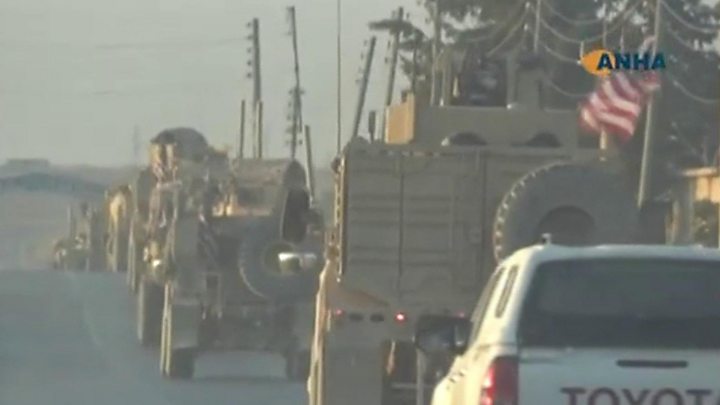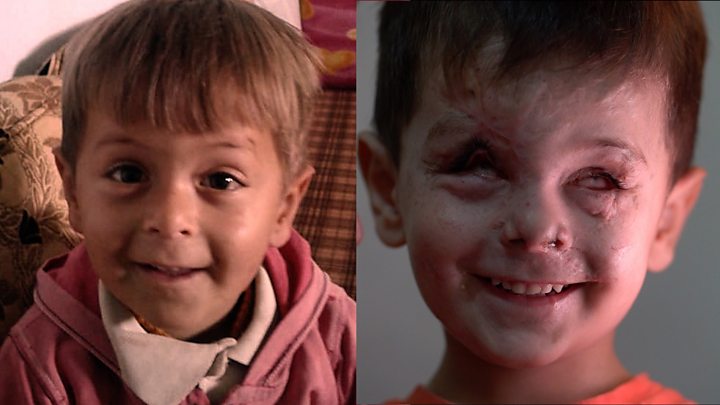Turkey ‘ready for operation’ in Syria as Trump defends US pullout
As Turkey prepares an offensive, President Trump says the US has not abandoned its Kurdish allies. …


Media playback is unsupported on your device
Turkey has said it is ready to launch its long-threatened operation in north-eastern Syria that could target Kurdish forces long allied to the US.
The announcement came after President Trump ordered a withdrawal of US troops from the border area, a move that was widely condemned at home and abroad.
Mr Trump defended his move again on Tuesday, saying the Kurds had not been abandoned, calling them “special”.
He softened his tone after threatening Turkey if it acted “off limits”.
In a series of tweets, Mr Trump praised Turkey as a trade partner and Nato ally, hours after saying he would “destroy and obliterate” its economy if the country took advantage of his surprise decision.
Mr Trump said his pullout – described as a “stab in the back” by Kurdish forces who helped defeat Islamic State (IS) in Syria – affected “only 50 soldiers”. The US has some 1,000 troops in Syria.
“We may be in the process of leaving Syria, but in no way have we Abandoned the Kurds, who are special people and wonderful fighters,” Mr Trump said.
Turkey regards the Kurdish militias, which dominate the US-allied Syrian Democratic Forces (SDF), as terrorists, and the US withdrawal was seen as paving the way for a Turkish offensive.
In an apparent response to Mr Trump’s earlier comments, Turkish Vice-President Fuat Oktay said the country would not bow to threats over its Syria plans, saying: “Where Turkey’s security is concerned, we determine our own path but we set our own limits.”
On Tuesday, the White House confirmed that Turkish President Recep Tayyip Erdogan would visit the US on 13 November at the invitation of President Trump.
Turkey wants to set up a 480km (300 mile) long and 30km deep “safe zone” along its border with Syria, to resettle up to two million of the more than 3.6 million Syrian refugees currently living in Turkey.
Eyes trained on the border
BBC’s Orla Guerin in Akcakale on the Turkish-Syria frontier
Here in Akcakale there is no sign of any Turkish military build-up, but on both sides of the border wall there is a sense that an offensive is coming, and probably soon.
There is no indication that the crescendo of international concern is altering Turkey’s plans for establishing a “safe zone”.
Dozens of TV cameras – local and international – are now trained on the border wall. For civilians and refugees on the other side, in north-eastern Syria, there are real fears of what a Turkish invasion could mean. Even if it’s limited in scope – and it’s unclear if it will be – it could cause massive displacement.
And what of the thousands of Islamic State prisoners being held in Kurdish-run detention centres? A spokesman for the SDF told the BBC that if the attack happened, they would have to focus on defending themselves and would have to withdraw some of their forces from the jails, and from areas recently liberated from IS.
What’s Turkey saying?
Turkey’s defence ministry said “all preparations for the operation have been completed,” adding the establishment of such a zone was “essential” for Syrians and for peace in the region.
If Turkey takes over areas controlled by Kurdish-led forces, the White House said Turkey would be responsible for all IS fighters held there.
In other developments:
- The Turkish military carried out strikes targeting the Syrian-Iraqi border to cut-off a transit route used by Kurdish forces, Reuters news agency quoted Turkish officials as saying
- A Kurdish leader in Syria said talks with the Syrian government and Russia were being considered “to block the Turkish attack”
What was the response in the US to the withdrawal?
Senate Majority Leader Mitch McConnell, the top Republican in Congress, was among those who criticised the decision. He said a “precipitous withdrawal of US forces from Syria would only benefit Russia, Iran and the Assad regime”.
Fellow Republican Lindsey Graham, a close ally of the president, called the move a “disaster in the making” while Nikki Haley, former US ambassador to the UN, said “leaving [the Kurds] to die [was] a big mistake”.
House Speaker Nancy Pelosi, a Democrat, said the president “must reverse this dangerous decision”, described by her as “reckless” and “misguided”.

Media playback is unsupported on your device




